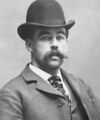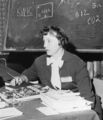Template:Selected anniversaries/November 17: Difference between revisions
No edit summary |
No edit summary |
||
| (19 intermediate revisions by the same user not shown) | |||
| Line 1: | Line 1: | ||
<gallery> | <gallery> | ||
||Johannes Bilberg | || *** DONE: Pics *** | ||
||1646: Johannes Bilberg born ... theologian, professor and bishop. As a professor he was involved in the controversy over Cartesianism. At the command of King Karl XI, Bilberg travelled to Torneå and Kengis along with Anders Spole to study the midnight sun. Pic. | |||
||1717: Johannes Bilberg dies ... theologian, professor and bishop. As a professor he was involved in the controversy over Cartesianism. At the command of King Karl XI, Bilberg travelled to Torneå and Kengis along with Anders Spole to study the midnight sun. Pic. | |||
File:August Ferdinand Möbius.jpg|link=August Ferdinand Möbius (nonfiction)|1790: Mathematician and astronomer [[August Ferdinand Möbius (nonfiction)|August Ferdinand Möbius]] born. He will discover the Möbius strip, a non-orientable two-dimensional surface with only one side when embedded in three-dimensional Euclidean space. | File:August Ferdinand Möbius.jpg|link=August Ferdinand Möbius (nonfiction)|1790: Mathematician and astronomer [[August Ferdinand Möbius (nonfiction)|August Ferdinand Möbius]] born. He will discover the Möbius strip, a non-orientable two-dimensional surface with only one side when embedded in three-dimensional Euclidean space. | ||
||1749 | ||1749: Nicolas Appert born ... chef, invented canning. Pic. | ||
File:James_Ferguson.jpg|link=James Ferguson (nonfiction)|1776: Astronomer, instrument maker, and author [[James Ferguson (nonfiction)|James Ferguson]] dies. | |||
|| | ||1833: Joseph Williams Lovibond born ... brewer who developed the world's first practical colorimeter as a means of ensuring the high quality of his beer. He was the originator of the Degrees Lovibond scale. Pic search. | ||
|| | ||1865: James McCune Smith dies ... physician, apothecary, abolitionist, and author ... He used his training in medicine and statistics to refute common misconceptions about race, intelligence, medicine, and society in general. Invited as a founding member of the New York Statistics Society in 1852, which promoted a new science, he was elected as a member in 1854 of the recently founded American Geographic Society. But he was never admitted to the American Medical Association or local medical associations ... also an abolitionist. Pic. | ||
||1884: Physicist and engineer Pál Selényi born. He was a pioneer of xerography. Pic. | |||
File:H. H. Holmes.jpg|link=H. H. Holmes (nonfiction)|1894: [[H. H. Holmes (nonfiction)|H. H. Holmes]], one of the first modern serial killers, is arrested in Boston, Massachusetts. | File:H. H. Holmes.jpg|link=H. H. Holmes (nonfiction)|1894: [[H. H. Holmes (nonfiction)|H. H. Holmes]], one of the first modern serial killers, is arrested in Boston, Massachusetts. | ||
||1902 | ||1912: Peter Calvocoressi born ... lawyer, Liberal politician, historian, and publisher. He served as an intelligence officer at Bletchley Park during World War II. Pic. | ||
||1902: Eugene Wigner born ... physicist and mathematician, Nobel Prize laureate. Pic. | |||
||Ruth Aaronson Bari | ||1917: Ruth Aaronson Bari born ... mathematician known for her work in graph theory and algebraic homomorphisms. Pic. | ||
File:Claire Kelly Schultz.jpg|link=Claire Kelly Schultz (nonfiction)|1924: Information scientist [[Claire Kelly Schultz (nonfiction)|Claire Kelly Schultz]] born. | File:Claire Kelly Schultz.jpg|link=Claire Kelly Schultz (nonfiction)|1924: Information scientist [[Claire Kelly Schultz (nonfiction)|Claire Kelly Schultz]] born. A "documentalist", she was particularly known for her work in thesaurus construction and machine-aided indexing, innovating techniques for punch card information retrieval. | ||
File:Alice Beta.jpg|link=Alice Beta|1925: Mathematician and social activist [[Alice Beta]] interviews famed inventor and data processing pioneer [[Herman Hollerith (nonfiction)|Herman Hollerith]]. | File:Alice Beta.jpg|link=Alice Beta|1925: Mathematician and social activist [[Alice Beta]] interviews famed inventor and data processing pioneer [[Herman Hollerith (nonfiction)|Herman Hollerith]]. | ||
||Aristid Lindenmayer | ||1925: Aristid Lindenmayer born ... biologist. In 1968 he developed a type of formal languages that is today called L-systems or Lindenmayer Systems. Using those systems Lindenmayer modelled the behaviour of cells of plants. L-systems nowadays are also used to model whole plants. Lindenmayer worked with yeast and filamentous fungi and studied the growth patterns of various types of algae, such as the blue/green bacteria Anabaena catenula. Originally the L-systems were devised to provide a formal description of the development of such simple multicellular organisms, and to illustrate the neighbourhood relationships between plant cells. Later on, this system was extended to describe higher plants and complex branching structures. Pic: https://alchetron.com/Aristid-Lindenmayer | ||
File:Herman_Hollerith.jpg|link=Herman Hollerith (nonfiction)|1929: Inventor [[Herman Hollerith (nonfiction)|Herman Hollerith]] dies. He will later be recognized as a pioneer of data processing. | File:Herman_Hollerith.jpg|link=Herman Hollerith (nonfiction)|1929: Inventor [[Herman Hollerith (nonfiction)|Herman Hollerith]] dies. He will later be recognized as a pioneer of data processing. | ||
| | ||1940: Eric Gill dies ... sculptor and typeface designer ... erotica, incest. Pic. | ||
||1940 | ||1940: Raymond Pearl dies ... biologist and academic ... eugenics, biostatistics. Pic. | ||
|| | ||1945: Operation Deadlight begins. Deadlight was a code name for the Royal Navy operation to scuttle German U-boats surrendered to the Allies after the defeat of Germany near the end of World War II. Of the 156 U-boats that surrendered to the allies at the end of the war, 116 were scuttled as part of Operation Deadlight. | ||
||1947 | ||1947: Emil Racoviță dies ... biologist, zoologist, speleologist, academic, explorer of Antarctica and the first biologist study arctic life. Pic. | ||
||1947: American scientists John Bardeen and Walter Houser Brattain observe the basic principles of the transistor, a key element for the electronics revolution of the 20th century. Pics. | |||
||Yutaka Taniyama | ||1958: Yutaka Taniyama dies ... mathematician known for the Taniyama–Shimura conjecture. Pic. | ||
||1969 | ||1969: Cold War: Negotiators from the Soviet Union and the United States meet in Helsinki, Finland to begin SALT I negotiations aimed at limiting the number of strategic weapons on both sides. | ||
||1970 | ||1970: Luna program: The Soviet Union lands Lunokhod 1 on Mare Imbrium (Sea of Rains) on the Moon. This is the first roving remote-controlled robot to land on another world and is released by the orbiting Luna 17 spacecraft. | ||
File: | File:Nixon April-29-1974.jpg|link=Watergate scandal (nonfiction)|1973: [[Watergate scandal (nonfiction)|Watergate scandal]]: In Orlando, Florida, U.S. President Richard Nixon tells 400 Associated Press managing editors "I am not a crook." | ||
||1973: The Athens Polytechnic uprising against the military regime ends in a bloodshed in the Greek capital. | |||
||1986: Harold Grad dies ... applied mathematician. His work specialized in the application of statistical mechanics to plasma physics and magnetohydrodynamics. Pic. | |||
|| | File:Robert Hofstadter.jpg|link=Robert Hofstadter (nonfiction)|1990: Physicist and academic [[Robert Hofstadter (nonfiction)|Robert Hofstadter]] dies. He shared the 1961 Nobel Prize in Physics (together with [[Rudolf Mössbauer (nonfiction)|Rudolf Mössbauer]]) "for his pioneering studies of electron scattering in atomic nuclei and for his consequent discoveries concerning the structure of nucleons". | ||
|| | ||2000: Louis Néel dies ... physicist and academic, Nobel Prize laureate. Pic. | ||
|| | ||2015: Irma M. Wyman dies ... early computer engineer and the first woman to become vice president of Honeywell, Inc. She was a systems thinking tutor and was the first female CIO of Honeywell. Pic search. | ||
</gallery> | </gallery> | ||
Latest revision as of 16:13, 7 February 2022
1790: Mathematician and astronomer August Ferdinand Möbius born. He will discover the Möbius strip, a non-orientable two-dimensional surface with only one side when embedded in three-dimensional Euclidean space.
1776: Astronomer, instrument maker, and author James Ferguson dies.
1894: H. H. Holmes, one of the first modern serial killers, is arrested in Boston, Massachusetts.
1924: Information scientist Claire Kelly Schultz born. A "documentalist", she was particularly known for her work in thesaurus construction and machine-aided indexing, innovating techniques for punch card information retrieval.
1925: Mathematician and social activist Alice Beta interviews famed inventor and data processing pioneer Herman Hollerith.
1929: Inventor Herman Hollerith dies. He will later be recognized as a pioneer of data processing.
1973: Watergate scandal: In Orlando, Florida, U.S. President Richard Nixon tells 400 Associated Press managing editors "I am not a crook."
1990: Physicist and academic Robert Hofstadter dies. He shared the 1961 Nobel Prize in Physics (together with Rudolf Mössbauer) "for his pioneering studies of electron scattering in atomic nuclei and for his consequent discoveries concerning the structure of nucleons".







